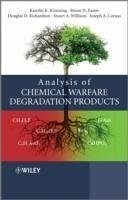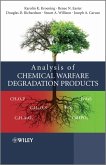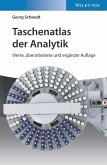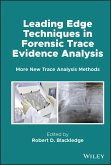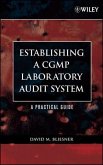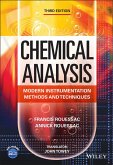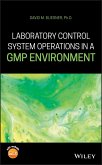Analysis of Chemical Warfare Degradation Products (eBook, PDF)


Alle Infos zum eBook verschenken

Analysis of Chemical Warfare Degradation Products (eBook, PDF)
- Format: PDF
- Merkliste
- Auf die Merkliste
- Bewerten Bewerten
- Teilen
- Produkt teilen
- Produkterinnerung
- Produkterinnerung

Hier können Sie sich einloggen

Bitte loggen Sie sich zunächst in Ihr Kundenkonto ein oder registrieren Sie sich bei bücher.de, um das eBook-Abo tolino select nutzen zu können.
This book describes nerve agents and vesicants, their decomposition and their degradation products' chemistry as well as their toxicity including a list of detection techniques of nerve agents and their degradation products. This book will present their history, toxicity, comparison between different sample preparation methods, separation techniques, and detection methods all together in a short, easy to read book, tied together by a single group doing the writing and the editing to assure smooth transition from chapter to chapter, with sufficient Tables and literature references for the…mehr
- Geräte: PC
- mit Kopierschutz
- eBook Hilfe
- Größe: 1.18MB
![Analysis of Chemical Warfare Degradation Products (eBook, ePUB) Analysis of Chemical Warfare Degradation Products (eBook, ePUB)]() Karolin K. KroeningAnalysis of Chemical Warfare Degradation Products (eBook, ePUB)72,99 €
Karolin K. KroeningAnalysis of Chemical Warfare Degradation Products (eBook, ePUB)72,99 €![Chemical Weapons Convention Chemicals Analysis (eBook, PDF) Chemical Weapons Convention Chemicals Analysis (eBook, PDF)]() Chemical Weapons Convention Chemicals Analysis (eBook, PDF)422,99 €
Chemical Weapons Convention Chemicals Analysis (eBook, PDF)422,99 €![Taschenatlas der Analytik (eBook, PDF) Taschenatlas der Analytik (eBook, PDF)]() Georg SchwedtTaschenatlas der Analytik (eBook, PDF)37,99 €
Georg SchwedtTaschenatlas der Analytik (eBook, PDF)37,99 €![Leading Edge Techniques in Forensic Trace Evidence Analysis (eBook, PDF) Leading Edge Techniques in Forensic Trace Evidence Analysis (eBook, PDF)]() Leading Edge Techniques in Forensic Trace Evidence Analysis (eBook, PDF)96,99 €
Leading Edge Techniques in Forensic Trace Evidence Analysis (eBook, PDF)96,99 €![Establishing A CGMP Laboratory Audit System (eBook, PDF) Establishing A CGMP Laboratory Audit System (eBook, PDF)]() David M. BliesnerEstablishing A CGMP Laboratory Audit System (eBook, PDF)117,99 €
David M. BliesnerEstablishing A CGMP Laboratory Audit System (eBook, PDF)117,99 €![Chemical Analysis (eBook, PDF) Chemical Analysis (eBook, PDF)]() Francis RouessacChemical Analysis (eBook, PDF)55,99 €
Francis RouessacChemical Analysis (eBook, PDF)55,99 €![Laboratory Control System Operations in a GMP Environment (eBook, PDF) Laboratory Control System Operations in a GMP Environment (eBook, PDF)]() David M. BliesnerLaboratory Control System Operations in a GMP Environment (eBook, PDF)126,99 €
David M. BliesnerLaboratory Control System Operations in a GMP Environment (eBook, PDF)126,99 €-
-
-
Dieser Download kann aus rechtlichen Gründen nur mit Rechnungsadresse in A, B, BG, CY, CZ, D, DK, EW, E, FIN, F, GR, HR, H, IRL, I, LT, L, LR, M, NL, PL, P, R, S, SLO, SK ausgeliefert werden.
- Produktdetails
- Verlag: John Wiley & Sons
- Seitenzahl: 160
- Erscheinungstermin: 2. März 2011
- Englisch
- ISBN-13: 9781119993698
- Artikelnr.: 38401580
- Verlag: John Wiley & Sons
- Seitenzahl: 160
- Erscheinungstermin: 2. März 2011
- Englisch
- ISBN-13: 9781119993698
- Artikelnr.: 38401580
- Herstellerkennzeichnung Die Herstellerinformationen sind derzeit nicht verfügbar.
1 Historical Milieu.
1.1 Organophosphorus Nerve Agents.
1.2 Blister Agents.
1.3 Sternutator Agents.
1.4 Chemical Weapons Convention (CWC).
1.4.1 Schedule of Chemicals.
1.4.2 Destruction of Chemical Weapons.
References.
2 Toxicity of Chemical Warfare Agents and their Degradation Products.
2.1 Organophosphorus Nerve Agent Toxicity.
2.1.1 Toxicity Mechanism - Acetylcholinesterase Inhibition.
2.1.2 Exposure.
2.1.3 Response, Treatment and Prevention.
2.2 Toxicity of Nerve Agent Degradation Products.
2.2.1 Toxicity of GA (Tabun) Degradation Products.
2.2.2 Toxicity of GB (Sarin) Degradation Products.
2.2.3 Toxicity of GD (Soman) Degradation Products.
2.2.4 Toxicity of GF (Cyclosarin) Degradation Products.
2.2.5 Toxicity of VX Degradation Products.
2.3 Toxicity of Blister Agents.
2.4 Toxicity of Sternutator Agents.
2.4.1 Toxicity of Degradation Products of Sternutator Agents.
References.
3 Analysis of Chemical Warfare Agents.
3.1 Introduction.
3.2 Minimally Invasive Detection Techniques.
3.3 Separation and Detection Techniques.
3.3.1 Capillary Electrophoresis.
3.3.2 Ion Mobility Spectrometry.
3.3.3 Gas Chromatography (GC)/Gas Chromatography-Mass Spectrometry (GC-MS).
3.3.4 Liquid Chromatography (LC)/Liquid Chromatography-Mass Spectrometry
(LC-MS).
3.3.5 Desorption Electrospray Ionization and Direct Analysis in Real Time
Mass Spectrometry.
References.
4 Chemical Warfare Agent Degradation Products.
4.1 Analysis of Nerve Agent Degradation Products.
4.1.1 Sample Preparation.
4.1.2 Liquid-Liquid Extraction (Pre-concentration).
4.1.3 Solid Phase Extraction (SPE).
4.1.4 Solid Phase Microextraction (SPME).
4.1.5 Stir Bar Sorptive Extraction (SBSE).
4.1.6 Derivatization.
4.2 Analytical Techniques.
4.2.1 Gas Chromatography (GC).
4.2.2 Liquid Chromatography (LC).
4.2.3 Elemental Speciation.
4.2.4 Ion Mobility.
4.2.5 Capillary Electrophoresis.
4.3 Analysis of Sulfur Mustard Degradation Products.
4.4 Analysis of Sternutator Degradation Products.
References.
Appendix.
Index.
1 Historical Milieu.
1.1 Organophosphorus Nerve Agents.
1.2 Blister Agents.
1.3 Sternutator Agents.
1.4 Chemical Weapons Convention (CWC).
1.4.1 Schedule of Chemicals.
1.4.2 Destruction of Chemical Weapons.
References.
2 Toxicity of Chemical Warfare Agents and their Degradation Products.
2.1 Organophosphorus Nerve Agent Toxicity.
2.1.1 Toxicity Mechanism - Acetylcholinesterase Inhibition.
2.1.2 Exposure.
2.1.3 Response, Treatment and Prevention.
2.2 Toxicity of Nerve Agent Degradation Products.
2.2.1 Toxicity of GA (Tabun) Degradation Products.
2.2.2 Toxicity of GB (Sarin) Degradation Products.
2.2.3 Toxicity of GD (Soman) Degradation Products.
2.2.4 Toxicity of GF (Cyclosarin) Degradation Products.
2.2.5 Toxicity of VX Degradation Products.
2.3 Toxicity of Blister Agents.
2.4 Toxicity of Sternutator Agents.
2.4.1 Toxicity of Degradation Products of Sternutator Agents.
References.
3 Analysis of Chemical Warfare Agents.
3.1 Introduction.
3.2 Minimally Invasive Detection Techniques.
3.3 Separation and Detection Techniques.
3.3.1 Capillary Electrophoresis.
3.3.2 Ion Mobility Spectrometry.
3.3.3 Gas Chromatography (GC)/Gas Chromatography-Mass Spectrometry (GC-MS).
3.3.4 Liquid Chromatography (LC)/Liquid Chromatography-Mass Spectrometry
(LC-MS).
3.3.5 Desorption Electrospray Ionization and Direct Analysis in Real Time
Mass Spectrometry.
References.
4 Chemical Warfare Agent Degradation Products.
4.1 Analysis of Nerve Agent Degradation Products.
4.1.1 Sample Preparation.
4.1.2 Liquid-Liquid Extraction (Pre-concentration).
4.1.3 Solid Phase Extraction (SPE).
4.1.4 Solid Phase Microextraction (SPME).
4.1.5 Stir Bar Sorptive Extraction (SBSE).
4.1.6 Derivatization.
4.2 Analytical Techniques.
4.2.1 Gas Chromatography (GC).
4.2.2 Liquid Chromatography (LC).
4.2.3 Elemental Speciation.
4.2.4 Ion Mobility.
4.2.5 Capillary Electrophoresis.
4.3 Analysis of Sulfur Mustard Degradation Products.
4.4 Analysis of Sternutator Degradation Products.
References.
Appendix.
Index.
